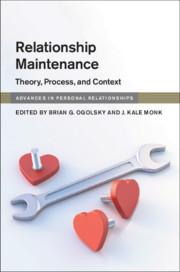Book contents
- Relationship Maintenance
- Advances in Personal Relationships
- Relationship Maintenance
- Copyright page
- Contents
- Tables
- Figures
- Contributors
- Part I Introduction
- Part II Theories of Relationship Maintenance
- Part III Processes of Relationship Maintenance
- Part IV The Social Context of Relationship Maintenance
- 14 Gender and Race Perspectives on Relationship Maintenance
- 15 Relationship Maintenance across Cultural Groups
- 16 Relationship Maintenance in the Age of Technology
- 17 Relationship Maintenance across the Life Course
- 18 Relationship Maintenance in Couple Therapy and Relationship Education
- Part V Conclusion
- Index
- References
15 - Relationship Maintenance across Cultural Groups
from Part IV - The Social Context of Relationship Maintenance
Published online by Cambridge University Press: 02 December 2019
- Relationship Maintenance
- Advances in Personal Relationships
- Relationship Maintenance
- Copyright page
- Contents
- Tables
- Figures
- Contributors
- Part I Introduction
- Part II Theories of Relationship Maintenance
- Part III Processes of Relationship Maintenance
- Part IV The Social Context of Relationship Maintenance
- 14 Gender and Race Perspectives on Relationship Maintenance
- 15 Relationship Maintenance across Cultural Groups
- 16 Relationship Maintenance in the Age of Technology
- 17 Relationship Maintenance across the Life Course
- 18 Relationship Maintenance in Couple Therapy and Relationship Education
- Part V Conclusion
- Index
- References
Summary
In this chapter, the authors draw upon Abraham Maslow’s self-actualization theory, Eli Finkel’s suffocation model of marriage, and Arthur and Elaine Aron’s self-expansion model in the process of examining relationship maintenance among members of various cultural groups. A review of the literature on nationality as culture (following Goodwin) suggests limited support for the effects of a nation-level East–West dichotomy on mean levels of relationship maintenance behaviors (i.e., where such an effect exists, persons in Western nations sometimes engage in significantly higher levels of relationship maintenance behaviors than do persons in Eastern nations) and the effects of such a dichotomy on covariance between equity norms and relationship maintenance behaviors (i.e., where such an effect exists, within Western nations only, individuals are more likely to engage in relationship maintenance behaviors when they perceive their relationships as equitable rather than unequitable). However, the effects in question are not consistent and do not generalize to ethnic group differences in means or covariance involving relationship maintenance behaviors within Eastern or Western nations. Implications for studies that integrate cultural psychology with relationship science are discussed.
Keywords
- Type
- Chapter
- Information
- Relationship MaintenanceTheory, Process, and Context, pp. 284 - 303Publisher: Cambridge University PressPrint publication year: 2019

